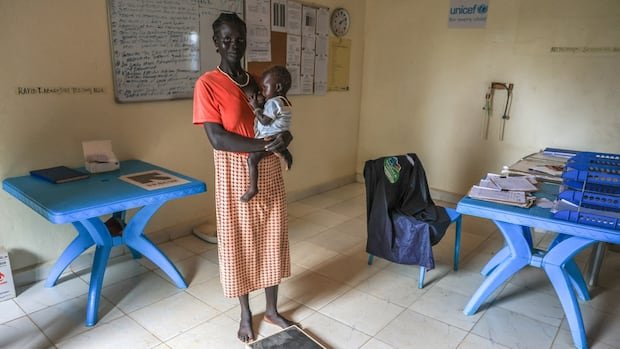Mary Abdullah brought her 13-month-old daughter, Jote, to Bunj Hospital in North South Sudan eight days ago, filled with apprehension about her survival. Jote, weighing only five kilograms, was battling anemia and malnutrition, reflecting the plight of many malnourished infants in the region. Abdullah, who sustains her family by gathering firewood, faced financial losses trekking seven kilometers from her home to the hospital due to reduced funding affecting medication deliveries and staffing levels.
South Sudan, boasting significant oil reserves, heavily relies on oil exports for economic sustenance. However, factors like corruption, civil unrest, neighboring conflicts, and climate challenges have plunged a large portion of the population into dependency on foreign aid. The UN reports that over 70% of South Sudan’s populace, equating to nine million people, requires external assistance, exacerbating the ongoing hunger crisis.
The reduction in US aid, which contributes around 40% of South Sudan’s aid, has triggered a major humanitarian fallout. The aid cuts, initiated by President Donald Trump in January, have led to the closure of vital healthcare facilities and unpaid staff. At Bunj Hospital, essential medicines and equipment are dwindling, with healthcare workers on strike due to six months of unpaid wages. The dire situation has left healthcare workers torn between their duty to patients and the pressing needs of their own families.
Local NGOs, grappling with the withdrawal of essential funds, are facing closure, intensifying the challenges faced by the vulnerable population. The aid cuts coincide with a severe economic crisis, climate-related disasters, and escalating ethnic tensions, further straining the already fragile social fabric of the nation. The ongoing instability, worsened by conflicts and natural disasters, compounds the plight of vulnerable groups like refugees and internally displaced persons.
The humanitarian crisis in South Sudan is deepening, with millions facing food insecurity and a healthcare system on the brink of collapse. The dwindling financial support and policy failures have hindered efforts to achieve stability and self-sufficiency, perpetuating the cycle of dependency on foreign aid. The recent UN revelations of massive corruption within South Sudan’s government highlight the systemic challenges plaguing the nation, necessitating urgent intervention to avert a humanitarian catastrophe.

